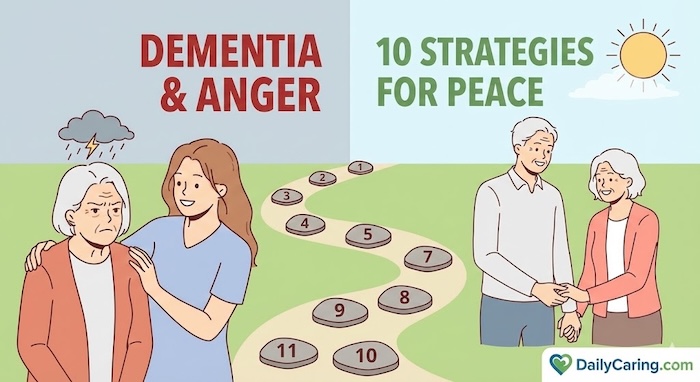When a loved one with dementia begins to see things that aren't there, repeat the same question endlessly, or become suddenly agitated, it can feel like you're losing your connection to them. These behaviors are often bewildering, frightening, and emotionally draining.
It's crucial to understand that these are not deliberate acts meant to frustrate you. They are symptoms of a disease, a form of communication emerging from a brain that is processing the world differently.

This comprehensive guide is designed to pull back the curtain on these complex behaviors. We'll explore the “why” behind the actions and provide you with a practical toolkit of response strategies, empowering you to move from confusion and reaction to understanding and compassionate connection.
Learning About Dementia Behaviors Reduces Caregiver Stress
Alzheimer’s disease and dementia inevitably cause changes in behavior as the disease progresses.
Your loved one might become angry, get anxious, or have hallucinations. It might seem like they’re misbehaving, childishly, or impulsively.
For caregivers, these unpredictable changes add to the stress of an already challenging job.
Understanding these dementia behaviors and their causes helps you deal with them more effectively and reduces uncertainty and stress.
We found a comprehensive free guide from the Lewy Body Dementia Association that explains common behavioral symptoms of dementia and shares helpful tips for reducing and managing challenging dementia behaviors.
These tips apply to all types of dementia, not just Lewy Body. Using this advice helps improve the quality of life for the person with dementia and for you.
We highlight their essential dementia care tips and give a brief overview of the guide's topics and how these suggestions make caring for someone with dementia a little easier.
Essential Dementia Care Tips
Because their ability to express themselves declines, people with dementia often unintentionally use behavior as a way to communicate.
When you observe a behavior, ask yourself why they might be acting this way and whether there is a cause or trigger. That helps you find ways to reduce or manage the behavior.
It’s important to remember that you can't use reason and logic to convince someone with dementia not to behave a certain way. Instead, find ways to decrease the intensity or frequency of the behavior.
Try these approaches:
- Try not to get angry or upset or take their behavior personally. They’re not acting this way on purpose.
- Speak calmly and softly.
- Suppose the behavior is aggressive, back away and give them space. Then, approach calmly and don't argue.
- Consider potential causes of the behavior. Are they tired, hungry, in pain, frustrated, lonely, or bored? Could it be a medication side effect?
- Respond to the emotion, not the behavior, and avoid using reason or logic to explain.
Validate, join, and distract.
A practical method for managing a challenging behavior is to validate, join, and distract.
Validate the emotion behind their actions, join in what they’re doing, and then use distraction to redirect them to the actions you’d prefer them to take.
(Get more specific tips and examples of these techniques directly from the guide itself.)
VIDEO: Understanding Dementia Behaviors for the Caregiver
Free Guide Helps Reduce Challenging Dementia Behaviors
The Lewy Body Dementia Association’s guide offers practical tips and suggestions for reducing and managing challenging dementia behaviors.
Here, we share summaries of how each topic helps you and your older adult cope with common dementia symptoms.
Refer to the guide (print or save it here) for specific, detailed suggestions that you can use in everyday life.
1. Using routines
In the dementia brain, habits are a type of memory that tends to remain intact longer.
Creating and sticking to a routine means that your older adult will do things based on habit and won’t have to think about what to do next – it becomes automatic.
Using habit memory often means that your older adult can participate in meaningful or purposeful activities for longer.
A routine might include eating breakfast before getting dressed, sitting in the same recliner in the living room each morning, attending an adult day program in the afternoon, and taking a bath in the evening.
Get tips on creating and maintaining helpful routines.
2. Communicating effectively with the person who has dementia
As their dementia progresses, an older adult’s ability to communicate will decline. Understanding how the disease affects them helps you communicate as effectively as possible for as long as possible.
Even when your older adult can’t respond in the way they used to, being able to communicate with them helps keep them engaged in life for as long as possible.
Get tips on improving communication with your older adult.
3. Wandering
People with dementia often walk or pace aimlessly at some point during the disease. It can happen indoors or outdoors, where they’re likely to get lost or injured.
This behavior could be caused by memory loss and disorientation, or by curiosity, restlessness, boredom, fear, loneliness, or even a basic need like hunger or thirst.
Get tips on how to reduce or manage someone’s tendency to wander so you can keep them safe.
4. Preventing or defusing aggression or catastrophic reactions
When someone with dementia gets frustrated, scared, or can’t communicate, they might become irritable or angry. That could lead to an extreme outburst.
A variety of factors could cause this, such as loud noises, too many questions, feeling insecure or left out, minor accidents, being reprimanded, arguing, a tense or irritable caregiver, or tasks that are too difficult.
Get tips on how to prevent or reduce these emotional blow-ups.
5. Benefits of exercise for people with dementia
There are many well-documented benefits of exercise for people with dementia. It can also reduce challenging behaviors and make caregiving easier.
Get tips on how to help your older adult get started with exercise and incorporate it into their daily routine.
6. Managing sleep problems
Many people with dementia have problems with sleep. In fact, sleep problems are one reason people with dementia end up in assisted living or nursing homes.
Someone with dementia might also experience something called sundowning. It’s when the person gets increasingly agitated, confused, and restless, starting in late afternoon or early evening and continuing through the night.
Get tips on reducing and managing evening and nighttime agitation.
7. Smoothing the transition on moving day
Moving from one place to another means changes in routine and an unfamiliar environment. This can be especially stressful to someone with dementia.
Get tips on how to make transitioning to a new home or a care community as comfortable and easy as possible for your older adult.
8. Finding in-home caregivers
Caregiving is a harsh and unrelenting job. Getting help from others is essential for protecting your own health and well-being.
Whether you find volunteers or in-home caregivers, it’s essential to find help that allows you to take breaks and share the workload.
Get tips on figuring out what type of help is needed and how to find available options in your community.
9. Care for the caregiver
Taking care of your own health and well-being means that you’ll be able to sustain caregiving in the long run.
Get tips on how to take care of yourself while you’re caring for your older adult.
10. Support groups: Should I join one?
Caring for someone with dementia can be overwhelming, exhausting, and all-consuming.
On top of that, caregiving brings up strong emotions like anger, guilt, frustration, discouragement, worry, grief, isolation, and more.
A caregiver support group gives you the chance to speak with people in similar situations, vent frustrations, and find out about tried-and-tested tips and helpful resources.
Find out more about the benefits of caregiver support groups and how to find one near you.
Final Thoughts on Understanding Dementia Behaviors
Navigating dementia behaviors is a journey that demands immense patience, resilience, and a profound shift in perspective. This guide is not a quick-fix manual, but a compass to help you find your way.
The goal is not to eliminate all challenging behaviors, but to become a skilled and compassionate detective who seeks to understand the unmet need behind the behavior. Your calm and reassuring presence is the most powerful tool you possess. Be patient with your loved one as their world changes, and be incredibly patient with yourself as you learn this new language of care.
You are their anchor in a sea of confusion, and your efforts to understand are the ultimate expression of love.
Next Steps: Print or save the free guide Understanding Behavioral Changes in Dementia from the Lewy Body Dementia Association (PDF)
Recommended for you:
- 6 Things to Try Before Using Antipsychotics for Dementia Behaviors
- 8 Ways to Deal with False Dementia Accusations
- 9 Best Alzheimer’s and Dementia Books for Caregivers
About the Author

Connie is the founder of DailyCaring.com and was a hands-on caregiver for her grandmother for 20 years. (Grandma made it to 101 years old!) She knows how challenging, overwhelming, and all-consuming caring for an older adult can be. She also understands the importance of support, especially in the form of practical solutions, valuable resources, and self-care tips.













